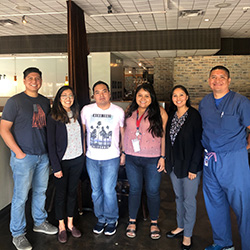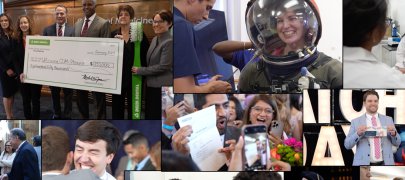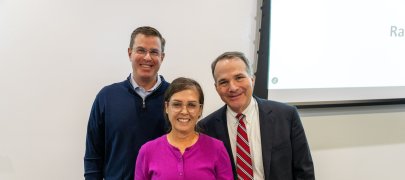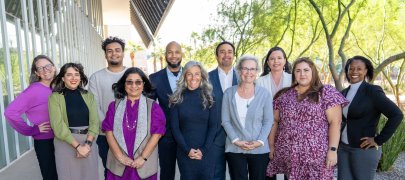Students Learn from Mentors Underrepresented in Medicine
Medical students at the University of Arizona College of Medicine – Phoenix have the unique opportunity to network with physicians of similar backgrounds to gain mentorship and motivation to become the next generation of physician leaders.
The college’s Office of Diversity and Inclusion created the Fellowship and Mentoring Program — also known as FAM — for medical students who represent various dimensions of diversity, including underrepresented in medicine, economically disadvantaged, educationally under-resourced or from rural upbringings.
“The Fellowship and Mentoring Program provides students with the opportunity to learn from physicians who share their identity and can identify with the unique needs of the group,” said Sonji Muhammad, MA, assistant director of Diversity and Inclusion. “The purpose is to provide a safe space for mentees to ask questions, discuss challenges and successes and learn about how their culture or background is represented in the field of medicine.”

Kristina Yancey, a second-year medical student, participated in the program with mentor Esteban Gomez, MD, a pediatric hematologist-oncologist at Phoenix Children’s Hospital.
“As a first-generation college student and the only person in my family and social circle to pursue a career in medicine, I felt it was necessary for me to seek out opportunities to establish professional relationships with physicians in the community,” Yancey said.
Yancey said it was a great experience and she’d absolutely recommend the program to others.
“The best part was that my mentor really took the time to get to know me, ask about my professional goals and offered practical advice and support,” Yancey said.
Ricardo Correa, MD, program director of the Endocrinology, Diabetes and Metabolism Fellowship at the UA College of Medicine – Phoenix, has been a mentor for FAM since its inception.
“Mentorship helped in my career, and I wanted to give the opportunity to others,” he said. “I want to show others that no matter their background, if you set a goal, you can achieve it.”
According to Dr. Correa, 40 percent of the Phoenix population is Hispanic, but only 3 percent of faculty at the medical school are Hispanic. Dr. Correa said he had multiple mentors throughout his career that guided him. He wants to motivate his mentees, show them that their dreams are possible and help them learn from his mistakes.
Dr. Correa said he would recommend the mentorship program to students and hopes it can one day expand to the graduate medical education community to support, motivate and guide the next generation of physicians.
About the College
Founded in 2007, the University of Arizona College of Medicine – Phoenix inspires and trains exemplary physicians, scientists and leaders to optimize health and health care in Arizona and beyond. By cultivating collaborative research locally and globally, the college accelerates discovery in a number of critical areas — including cancer, stroke, traumatic brain injury and cardiovascular disease. Championed as a student-centric campus, the college has graduated more than 900 physicians, all of whom received exceptional training from nine clinical partners and more than 2,700 diverse faculty members. As the anchor to the Phoenix Bioscience Core, which is projected to have an economic impact of $3.1 billion by 2025, the college prides itself on engaging with the community, fostering education, inclusion, access and advocacy.


